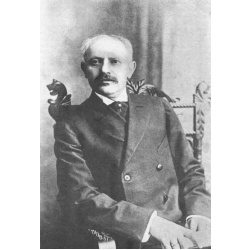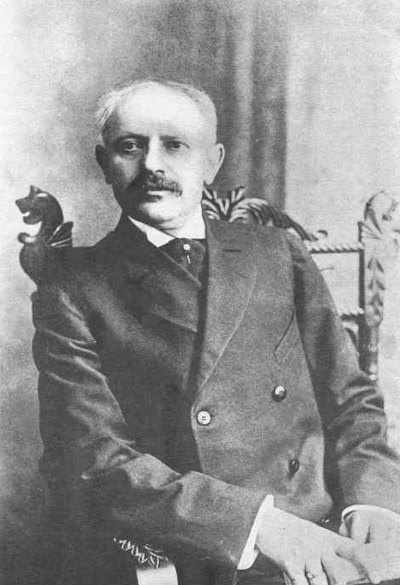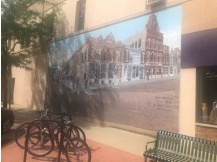
LOCAL HISTORY: Ben Bear--a man for our times
When Ben Bear died on March 22, 1938, the following week "The Decorah Journal" devoted four front-page articles (half its front page!) to mourning the death and celebrating the life of the local business owner. He was the owner and manager of Ben Bear Clothing, a business he'd started in 1876 at the age of 23. His obituary proclaimed: "Ben Bear brought more favorable publicity to Decorah than any other citizen in the 62 years he made Decorah his home."
Admirers noted his warm smile, affable manner, and business acumen. They noted his firm handshake, and his sense of justice. Customers and community members would also compliment his poise, the way he gracefully held his head, and the crisp tailoring of his suits. He was industrious and forthright; his philosophy was fairness and progress through persistent innovation and hard work.
He was also a Jew, and a German immigrant, and these two facts certainly influenced him; but they didn't complete him. In "The Decorah Journal's" reporting of his death, besides noting a Rabbi officiated the funeral, no mention is made of Bear's Judaism. Success in America required integration, and we can assume Bear's success in Decorah was, in part, influenced by his success at integrating into American culture.
100 years ago, the name "Ben Bear" would've been recognized by every adult in the community. Today, some recall the name and its mythos; others do not. Many of the details have been forgotten, lost to time and death. But a case can be made that this man's story—a German Jew's story of migration, entrepreneurship, and fairness—has a lot to tell us today.
The story begins with Bear's birth in 1853 in Hohebach, Germany. His mother, Rose Tannebaum, came from a prominent Jewish family in Wurtemherg, Germany, and his father, Jacob, made a living in the wool and grain business. As a boy, Bear apprenticed with his father, where he began to learn the textile trade.
At thirteen, he left school and his family and boarded the steamship Herman of the North German Lloyd for a month-long journey to New York City. It was 1867 and the wounds of the Civil War still fresh. Immigrants were streaming into America in search of opportunity and a fair deal.
The steamship docked in New York City at four o'clock in the afternoon on a Saturday. The following morning, Ben, a thirteen year-old German Jew fresh off the boat, walked to the corner of Fourth Street and Avenue D., where the prestigious general store of Rosenthal & Sulzberger was operated. He arrived early—7 a.m.—and was hired as an errand boy. He spent nine years at the clothing firm, rising quickly through the ranks due to his charm and ambition, his industriousness and amiability, until eventually becoming general manager.
New York City was overcrowded and young Ben Bear dreamed of owning his own store. So in the spring of 1876, at the age of 23 and with some money saved, he caught a train for Chicago, where he stayed overnight. The next morning he boarded a Pullman car headed for Cedar Rapids, Iowa, a new state and still very much frontier life. It was the frontier, and it was opportunity. He found the clothing market saturated in Cedar Rapids and traveled Iowa and Minnesota over the next ten days, searching for the exact fit for his clothing store.
The last stop on his journey was Decorah, a new township with no clothing store. He arrived at dusk. It was March and the ground was still thawing. The next day, early in the morning, Bear brushed his thinning fair hair, dressed in his best suit, and walked to the corner of present day Water Street and Winnebago Street and rented a meager (23 ft. by 40ft.) wooden building from local businessman Cyrus Adams. The two would be in business for years, with Bear eventually purchasing from Cyrus the plot that is presently Donlon's Pharmacy.
After he shook hands with Adams, he rushed back to New York City to buy merchandise. This would be one of hundreds of trips he'd make to New York City and Europe throughout his lifetime to buy merchandise, clarify his fashion and cultural palate, and reconnect with the New York clothing district. Bear shipped the merchandise to his new home: Decorah, Iowa. When he arrived back in Decorah, he immediately went to work operating the Centennial Clothing Store, named in honor of the nation's 100th birthday.
Business would soon grow and Bear would expand his clothing store and change the name to Ben Bear Clothing. Bear prospered and soon become the most influential person in Decorah. He was a member of countless boards, committees, and community groups. He was a sponsor of the Grand Opera House, the Decorah Hospital and the Winneshiek Hotel. He was referred to as "the oldest member of the Chamber of Commerce" and on the day of his death, all chamber members stood for a moment of silent prayer. The United States Senator Lafayette Young referred to Bear as the "godfather of Decorah." He was a stalwart supporter of Luther College, sponsoring countless band trips.
Shortly after World War I, Bear championed the Winneshiek County Pig Club, an organization formed to raise money for the Red Cross. 2,249 pigs—donated by local farmers—were loaded onto two dozen railroad cars and shipped to Chicago, where they sold for $7,675.47, all of which was donated to the Red Cross.
In 1916, approaching his sixties, Bear, still robust and industrious and showing no signs of retiring, incorporated his business and brought into the concern his employees. Shortly before his death in 1938, to protect his family and employees after his passing, Bear extended the incorporation 20 years.
Fred Bierman, who during his storied career would serve in the U.S. House, as well as serve as Decorah's Postmaster and owner of "The Decorah Journal," said of Bear: "[he] was an admirable example of those who have become Americans by deliberate choice and not by the good fortune of birth. Coming to our shores as a boy, he became a citizen of this great republic as soon as possible and to the end of his life he was devoted to her welfare and he always was grateful for the opportunities and blessings he found in his adopted land."
A week before he died, Bear called "Decorah Journal" reporter J.C. Hammond over to the store. The two were old friends. Each week for 62 years, Bear had walked to the newspaper building to deliver his ad that would run in the paper's next edition. Bear had called Hammond over to the store because he wanted his opinion on something. Bear had recently replaced the maple hardwood floor with the latest innovation in flooring--white rubber tiles. Well, Bear asked, what do you think?
The next week, in his remembrance of his friend, Hammond gave his answer: The "brightness" of the new white tiles, in the words of Hammond, "reflected the very character of the man."
Site designed and maintained by Iroc Web Design Services©.
Your Small Business Web Design Solutions.™



